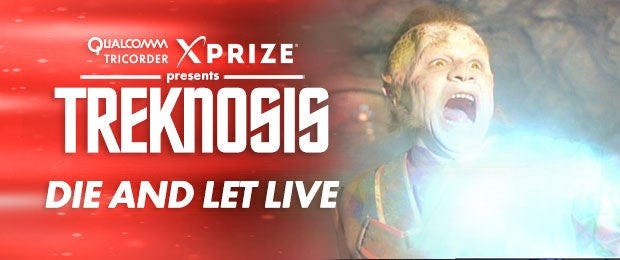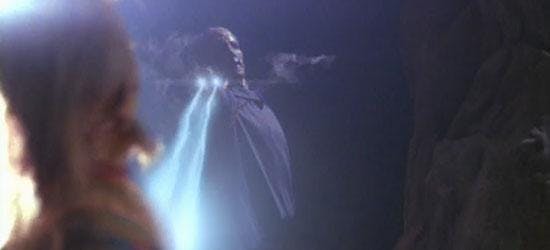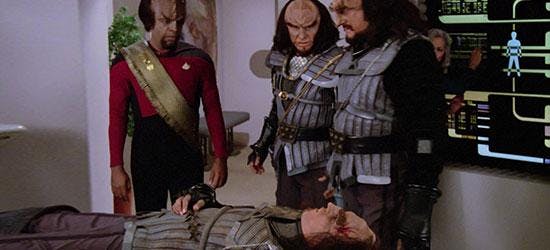
If you're a newcomer to the Delta Quadrant, you need to be on your guard: it's not the greatest neighborhood. There are kleptomaniac Caretakers stealing people from all corners of the galaxy, the Krenim keep trying to rewrite the local space-time continuum, and oh, yes -- you're also in the backyard of the Borg Collective. As if that weren't enough, you also have to worry about the Vidiian Sodality. Infected centuries ago by the Phage, a devastating and incurable plague that rotted their organs, the Vidiians did what any other ruthless society with an array of astounding medical technology would probably resort to eventually: commit themselves to becoming a race of ghoulish flesh marauders, running around stealing the organs right out of people's bodies. It's one thing to shoot somebody and then take their wallet, but picture shooting someone with a combined phaser and transporter beam that snatches their lungs from their ribcage!

Whatever organs the Vidiians manage to steal are then grafted onto their own bodies in a desperate bid for survival against the Phage. As you can imagine, it doesn't win them any beauty contests.

Actually, Vidiian organ-harvesting doctrine calls for them to get what they need from cadavers first and foremost, making them at least slightly less terrifying, but they're not above looking for live targets if their need is great (and it usually is). Eerily enough, that's something with which we humans in the 21st century have a lot of familiarity: anytime a major organ breaks down, we need a replacement from either a living human or someone who died under very specific circumstances. We get what we can from cadavers -- tissues and such can be put in storage for a long time before they go bad -- but for a whole and functioning organ, that's usually just not an option. The current state of our technology actually prevents us from rising to the level of Vidiian medical ethics, which is a weird thought.But we're making progress! Last fall, Australian surgeons successfully performed three heart transplants using hearts that came from fully dead people. Hearts are by far the hardest thing to transplant: typically, a heart has to come from a person who's been confirmed to be brain-dead but whose heart is still beating. Once such a donor is located, their heart is removed, put on ice for up to four hours for transit, and implanted in the waiting recipient. The Australian technique took hearts that had actually stopped beating for up to 20 minutes, put them in a special machine that kept them in a warm nutrient bath, and implanted them. Not only did the patients live, one even reported feeling years younger.This is a fantastic breakthrough for cardiac patients the world over; as you can probably imagine, the people waiting for a new heart vastly outnumber the ones who fit the criteria for donating them, at least by current standards -- you must be brain-dead, but your heart must still be beating. Imagine if instead, the requirements were "you must have died no more than 20 minutes ago." That would widen the field of available donors considerably! Of course, this assumes you'd be okay with surgeons breaking you down for parts a mere 20 minutes after you died. Any Klingon warrior worth his or her d'k tagh would agree -- to them, the body is a mere hollow shell after the spirit departs for Sto-vo-Kor anyway.

But of course, opinions may vary from person to person. I personally would side with the Klingons, and at least one forensic pathologist makes the case that it's actually immoral to require consent for cadaver organ donation. This is a question we're going to need to figure out how to answer eventually; as techniques like the Australian one are adapted and improved for other organs, we'll all need to sit down and really think about what we want done with our bodies after we die. If your family wants to bury you intact, but doctors can use your organs to save the lives of five people in dire need of transplants, who should win? As someone once said, “The needs of the many outweigh the needs of the few,” but pure Vulcan logic doesn't always stand up to the power of human grief.All debate aside, we'll at least be in fairly good shape someday soon from a purely technological standpoint to do well should something like the Vidiian Phage ever decide to pay us a visit.Jon Sung is a contributing writer for XPRIZE and copywriting gun-for-hire to startups and ventures all over the San Francisco Bay area. When not wrangling words for business or pleasure, he serves as the captain of the USS Loma Prieta, the hardest-partying Star Trek fan club in San Francisco.XPRIZE is an innovation engine. We design and operate prize competitions to address global crises and market failures, and incentivize teams around the world to solve them. Currently, we are operating numerous prizes, including the $30M Google Lunar XPRIZE, challenging privately funded teams to successfully land a robot on the Moon’s surface, and the $10M Qualcomm Tricorder XPRIZE, challenging teams around the world to create a portable, wireless, Star Trek-inspired medical device that allows you to monitor your health and medical conditions anywhere, anytime. The result? Radical innovation that will help us all live long and prosper. Sign up today to join our mission, be a part of our campaign and win collectibles at: tricorderfederation.org.




